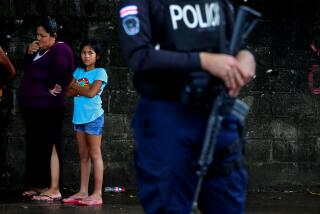DATELINE: MIAMI : Back to Turmoil as Usual With Cuba the Focus : The violence, tension and fiery rhetoric have returned as economic conditions worsen on the island and Castro talks of retirement.
- Share via
For months, Miami had been calm--almost too calm. No death threats had been leveled at liberal radio commentators or outspoken professors. The Miami Herald’s newspaper boxes were not being vandalized by readers who objected to its editorial policy.
The Cuban Museum of Arts and Culture opened an exhibition of works by an artist with ties to Cuba, and, though there were threats, no one actually bombed the place. “We were surprised,” museum director Ramon Cernuda said. “We were preparing for problems.”
Then, just after the Ides of March, life suddenly returned to normal. An explosive week of street violence, overheated exile rhetoric and only-in-Miami politics began after a leftist group called the Antonio Maceo Brigade organized a demonstration calling for the United States to lift the trade embargo against Cuba.
As a site for the demonstration, the brigade picked the street in front of Spanish-language Radio Mambi, whose general manager, Armando Perez-Roura, denounced the protesters as traitors and agents of Fidel Castro, and urged listeners to show up and confront them.
They did. When the first sign-carrying brigade member arrived March 17, he was set upon by a mob of counterdemonstrators who began to punch him.
Police reinforcements were called. Rocks were hurled. Blood flowed. Cries of “Communist!” rang out. Ultimately, more than 20 people were arrested, and several, including two police officers hit by rocks, were injured.
“What we were doing was exercising our rights to voice opinions about our relatives and the Cuban people,” protested Andres Gomez, the brigade’s leader. “And we were met by behavior similar to the Nazis. This doesn’t go on in any other city in the world.”
The next day, Miami City Commissioner Miriam Alonso called Gomez and the brigade “aggressors” and suggested that the city explore the legality of banning them, along with other groups whose opinions might be “provocative.” Max Castro, a member of the board of the American Civil Liberties Union, shuddered. “When the stifling of free speech is justified by public officials, that’s very disturbing,” he said.
For more than 34 years, since the revolution on the island 200 miles south of here began to turn Miami into the world’s second-largest Cuban city, Castro has been a local issue. Political discourse on Cuba has been punctuated by murder, dozens of bombings--most unsolved--and scores of confrontations, many ending in violence.
But in recent months, even as worsening economic conditions pile more hardship on the Cuban people and Castro teases with talk of retirement, Miami’s vast exile community had remained tranquil. Now tensions are on the rise.
While the melee in front of Radio Mambi was taking place, Cuban-American lawmakers in Florida’s House of Representatives voted to deny compensation to the father of an accident victim because a dozen years ago he had ties to Nicaragua’s leftist Sandinista regime.
A day later, Eloy Gutierrez Menoyo, who fought with Castro in the 1950s and later defected to become a Miami dissident, issued a surprising call for a dialogue between Cuban exiles and the Cuban government and spoke against the Cuban Democracy Act that tightened trade restrictions against the island.
That was followed in the Florida House by another piece of anti-Castro legislation, offered by two Miami-based Cuban-Americans, which mirrors the federal ban by specifically prohibiting the investment of state money in any business that trades with Cuba.
Why the emotional outbreak of Cuban exile politicking now? “Frustrated aspirations,” says Lisandro Perez, a sociologist and director of the Cuban Research Institute at Florida International University in Miami. “Things are worse in Cuba. Castro is still there. The Republicans are out of power. And even though the Clinton Administration has spoken tough, people wonder if their position is being heard.”
Gomez, whose organization supports the Cuban Revolution but who denies that members are Castro agents, says that, despite the thrashing his outnumbered demonstrators received in front of the radio station, the climate in Miami has become more tolerant in recent years.
“The call for violence is heard less often now than before,” he said. “Still, when they hear different positions, the reaction of the intransigent right-wing element is to fight back with violence and intimidation.”
Many observers see outbreaks of violence in the Cuban exile community as cyclical and few would be surprised to see more eruptions.
At the same time, those who believe they have been victimized in the past hope that the latest violence may spur federal investigations of old crimes. In the past five years, for example, about 15 bombings have been linked to exile politics. None has been solved.
More to Read
Sign up for Essential California
The most important California stories and recommendations in your inbox every morning.
You may occasionally receive promotional content from the Los Angeles Times.













